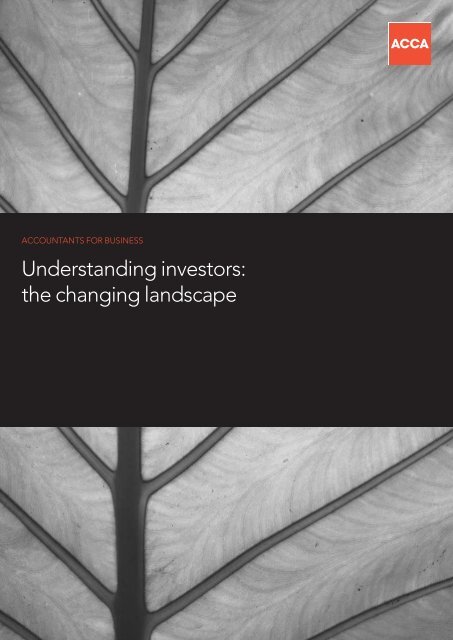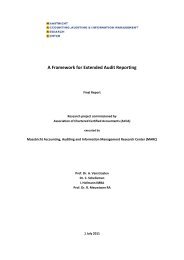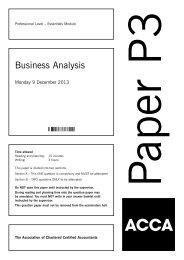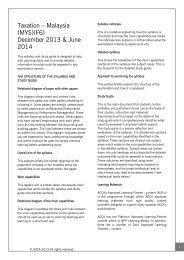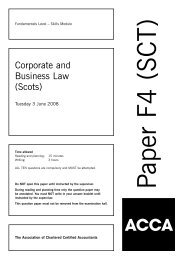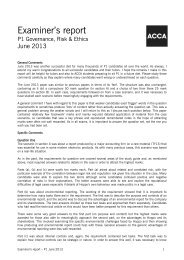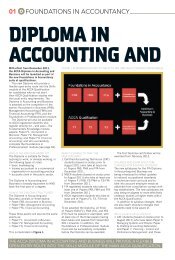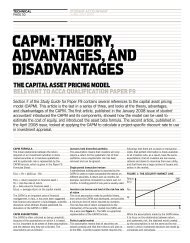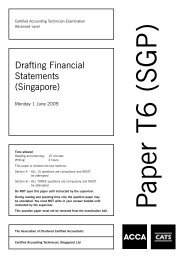Understanding investors: the changing landscape - ACCA
Understanding investors: the changing landscape - ACCA
Understanding investors: the changing landscape - ACCA
Create successful ePaper yourself
Turn your PDF publications into a flip-book with our unique Google optimized e-Paper software.
ACCOUNTANTS FOR BUSINESS<br />
<strong>Understanding</strong> <strong>investors</strong>:<br />
<strong>the</strong> <strong>changing</strong> <strong>landscape</strong>
About <strong>ACCA</strong><br />
<strong>ACCA</strong> (<strong>the</strong> Association of Chartered Certified<br />
Accountants) is <strong>the</strong> global body for professional<br />
accountants. We aim to offer business-relevant, firstchoice<br />
qualifications to people of application, ability and<br />
ambition around <strong>the</strong> world who seek a rewarding career<br />
in accountancy, finance and management.<br />
Founded in 1904, <strong>ACCA</strong> has consistently held unique<br />
core values: opportunity, diversity, innovation, integrity<br />
and accountability. We believe that accountants bring<br />
value to economies in all stages of development. We aim<br />
to develop capacity in <strong>the</strong> profession and encourage <strong>the</strong><br />
adoption of consistent global standards. Our values are<br />
aligned to <strong>the</strong> needs of employers in all sectors and we<br />
ensure that, through our qualifications, we prepare<br />
accountants for business. We work to open up <strong>the</strong><br />
profession to people of all backgrounds and remove<br />
artificial barriers to entry, ensuring that our qualifications<br />
and <strong>the</strong>ir delivery meet <strong>the</strong> diverse needs of trainee<br />
professionals and <strong>the</strong>ir employers.<br />
This report is <strong>the</strong> first of a four-part<br />
project examining what <strong>investors</strong><br />
want from corporate reporting and<br />
how organisations are responding<br />
to <strong>the</strong>ir needs.<br />
It reviews recent developments,<br />
trends and emerging issues in <strong>the</strong><br />
investor <strong>landscape</strong> since <strong>the</strong> global<br />
financial crisis. While it uses <strong>the</strong> UK<br />
and Ireland investor base for its<br />
analysis, <strong>the</strong> trends it identifies<br />
have a wide international<br />
resonance.<br />
We support our 154,000 members and 432,000 students<br />
in 170 countries, helping <strong>the</strong>m to develop successful<br />
careers in accounting and business, with <strong>the</strong> skills needed<br />
by employers. We work through a network of over 80<br />
offices and centres and more than 8,400 Approved<br />
Employers worldwide, who provide high standards of<br />
employee learning and development.<br />
ABOUT ACCOUNTANTS FOR BUSINESS<br />
<strong>ACCA</strong>’s global programme, Accountants for Business,<br />
champions <strong>the</strong> role of finance professionals in all sectors<br />
as true value creators in organisations. Through people,<br />
process and professionalism, accountants are central to<br />
great performance. They shape business strategy through<br />
a deep understanding of financial drivers and seek<br />
opportunities for long-term success. By focusing on <strong>the</strong><br />
critical role professional accountants play in economies at<br />
all stages of development around <strong>the</strong> world, and in<br />
diverse organisations, <strong>ACCA</strong> seeks to highlight and<br />
enhance <strong>the</strong> role <strong>the</strong> accountancy profession plays in<br />
supporting a healthy global economy.<br />
www.accaglobal.com/ri<br />
© The Association of Chartered Certified Accountants,<br />
June 2013
Contents<br />
Foreword 4<br />
1. Introduction 5<br />
2. Equity markets are increasingly short term 7<br />
3. Ultra-low interest rates are affecting investor behaviour 9<br />
4. Asset managers face a plethora of regulation 10<br />
5. New demands for enhanced information reporting 11<br />
6. Equity holdings continue to fall 12<br />
7. Risk management remains a key area of focus 14<br />
8. Asset managers seek more information 15<br />
9. Conclusion 16<br />
References 17<br />
UNDERSTANDING INVESTORS: THE CHANGING LANDSCAPE 3
Foreword<br />
<strong>ACCA</strong> has consistently argued that <strong>the</strong> role and interests of <strong>investors</strong> need<br />
to be better understood and placed more centrally in policymaking<br />
processes by legislators and standard setters. The <strong>investors</strong>’ voice is often<br />
not heard strongly enough, which is perhaps understandable given <strong>the</strong><br />
range of organisations and interests that can fall under <strong>the</strong> heading of<br />
‘<strong>investors</strong>’.<br />
In order to address this need for greater understanding of <strong>the</strong> investor<br />
<strong>landscape</strong>, <strong>ACCA</strong>, in collaboration with Longitude Research, has developed<br />
a four-stage project examining <strong>the</strong> <strong>changing</strong> investor universe, post-global<br />
financial crisis, and what <strong>investors</strong> want from corporate reporting. The<br />
project examines how pressure to respond to <strong>the</strong> needs of <strong>investors</strong> may<br />
change <strong>the</strong> approach taken by companies in reporting <strong>the</strong>ir activities and<br />
engaging investor groups.<br />
Over <strong>the</strong> four stages, <strong>the</strong> project examines:<br />
• recent developments in <strong>the</strong> investor <strong>landscape</strong>, trends and emerging<br />
issues since <strong>the</strong> global financial crisis<br />
• <strong>the</strong> kind of information <strong>investors</strong> need to make <strong>the</strong>ir decisions, how <strong>the</strong>y<br />
now like to receive that information (both <strong>the</strong> format and <strong>the</strong><br />
communications channel), and <strong>the</strong>ir level of trust in what <strong>the</strong>y receive<br />
• <strong>the</strong> move towards ‘real-time’ reporting, and how companies are<br />
responding to calls to disclose certain information with much more<br />
immediacy, ra<strong>the</strong>r than at <strong>the</strong> end of a quarter or year<br />
Helen Brand<br />
<strong>ACCA</strong> chief executive<br />
• how companies are already <strong>changing</strong> <strong>the</strong>ir investor engagement and<br />
reporting activities to reflect evolving investor demands, and what this<br />
means for <strong>the</strong> finance function and <strong>the</strong> CFO.<br />
This report is <strong>the</strong> first stage of that process. While it uses <strong>the</strong> UK and Ireland<br />
investor base for its analysis, <strong>the</strong> trends it identifies have a much wider<br />
resonance, internationally.<br />
4<br />
UNDERSTANDING INVESTORS: THE CHANGING LANDSCAPE
1. Introduction<br />
In different ways, <strong>the</strong> UK and Ireland are<br />
both important international centres for<br />
investment management. Despite <strong>the</strong><br />
severe impact of <strong>the</strong> global financial<br />
crisis, financial services, and asset<br />
management in particular, remain key<br />
pillars of <strong>the</strong> UK economy. In terms of<br />
assets under management, <strong>the</strong> UK is<br />
<strong>the</strong> second largest market in <strong>the</strong> world<br />
after <strong>the</strong> US. Although far smaller, <strong>the</strong><br />
Irish asset management industry plays a<br />
vital role as a domicile and distribution<br />
centre for investment funds. In recent<br />
years, a growing number of asset<br />
managers, hedge funds and money<br />
market funds have relocated to Ireland<br />
to take advantage of its efficient<br />
regulatory environment and open<br />
economy.<br />
In both <strong>the</strong> UK and Ireland, <strong>the</strong><br />
environment for investment<br />
management is <strong>changing</strong> rapidly.<br />
Challenging market conditions and a<br />
persistent ‘new normal’ of low growth,<br />
ultra-low interest rates and enhanced<br />
volatility are forcing a rethink of<br />
longstanding business models and<br />
strategies. Investors, rocked by <strong>the</strong><br />
financial crisis and its aftermath, are<br />
<strong>changing</strong> <strong>the</strong>ir behaviour. In addition,<br />
fast-<strong>changing</strong> regulation creates new<br />
opportunities and risks in equal<br />
measure.<br />
Against this challenging backdrop,<br />
asset management firms need frequent<br />
and transparent information about risks<br />
and opportunities across <strong>the</strong>ir<br />
investment portfolios. In particular, <strong>the</strong>y<br />
need to have confidence in <strong>the</strong><br />
reporting provided by companies to<br />
ensure that <strong>the</strong>ir investment decisions<br />
are made on <strong>the</strong> basis of an appropriate<br />
understanding of <strong>the</strong> true drivers of<br />
performance. This has been <strong>the</strong> driver<br />
for <strong>ACCA</strong>’s efforts to explore <strong>the</strong><br />
relationship between <strong>investors</strong> and<br />
corporates in greater depth.<br />
It is hard to underestimate <strong>the</strong> impact of<br />
<strong>the</strong> financial crisis – and ensuing<br />
economic downturn – on <strong>the</strong> UK’s<br />
investment sector. Pension funds, asset<br />
managers, insurance companies and<br />
retail <strong>investors</strong> have all been forced to<br />
ask fundamental questions about how<br />
<strong>the</strong>y approach asset allocation and<br />
investment strategy. Even long-held<br />
assumptions about <strong>the</strong> way markets<br />
work, such as <strong>the</strong> efficient markets<br />
<strong>the</strong>ory, have been called into question.<br />
The period since 2011 has, however,<br />
seen some improvement for <strong>the</strong> UK<br />
asset management industry. Total<br />
assets managed in <strong>the</strong> UK amounted to<br />
£4.2 trillion at December 2011, an<br />
increase of 7% over <strong>the</strong> previous year,<br />
according to figures from <strong>the</strong><br />
Investment Management Association<br />
(IMA) (IMA 2012) (see Figure 1.1). The<br />
most recent Confederation of British<br />
Industry (CBI) survey of attitudes in <strong>the</strong><br />
British investment management<br />
industry suggests that a slight recovery<br />
has lifted industry profitability, and<br />
investment managers have become<br />
increasingly optimistic as business<br />
volumes and incomes have grown for<br />
<strong>the</strong> fourth successive quarter (CBI 2013).<br />
Figure 1.1: Total assets under management in <strong>the</strong> UK and in UK authorised funds (2005–11)<br />
£bn<br />
4,000<br />
UK authorised funds<br />
Total assets under management<br />
3,000<br />
2,000<br />
1,000<br />
0<br />
Source: IMA (2012)<br />
2005 2006 2007 2008 2009 2010 2011<br />
UNDERSTANDING INVESTORS: THE CHANGING LANDSCAPE 5
The investment management industry<br />
continues to play a vital role in <strong>the</strong> UK<br />
economy. Compared with o<strong>the</strong>r leading<br />
countries, in <strong>the</strong> UK assets held<br />
represent a very high percentage of<br />
GDP (see Figure 1.2). The industry is<br />
also a major employer, providing an<br />
estimated 25,000 jobs, compared with<br />
an overall 85,000 across Europe<br />
(EFAMA 2012).<br />
Uncertainty in <strong>the</strong> global economy and financial<br />
markets, new investor expectations, an<br />
increasingly far-reaching and complex regulatory<br />
<strong>landscape</strong>, rapid technological change: all are<br />
having an impact.<br />
The Irish asset management industry is<br />
far smaller. An estimate from <strong>the</strong> Irish<br />
Central Bank puts assets under<br />
management by investment funds at<br />
€414.4bn as of September 2009<br />
(Godfrey et al. 2010). None<strong>the</strong>less,<br />
Ireland plays a very important role<br />
within Europe as a leading cross-border<br />
centre for fund administration and<br />
distribution. According to EFAMA,<br />
<strong>the</strong>re were 431 asset management<br />
companies in Ireland at <strong>the</strong> end of 2011<br />
– one of <strong>the</strong> highest numbers in Europe<br />
(EFAMA 2012). Along with Luxembourg,<br />
Ireland has been keen to position itself<br />
as an attractive domicile for non-UCITS<br />
funds, in particular, as it has a liberal<br />
regulatory regime and no minimum<br />
investment requirement.<br />
Yet challenges abound for both<br />
countries. The industry is faced with a<br />
combination of economic, financial and<br />
regulatory changes. Uncertainty in <strong>the</strong><br />
global economy and financial markets,<br />
new investor expectations, an<br />
increasingly far-reaching and complex<br />
regulatory <strong>landscape</strong>, rapid technological<br />
change: all are having an impact.<br />
Also, with slow growth predicted for<br />
many years to come, <strong>investors</strong> are<br />
asking <strong>the</strong>mselves where <strong>the</strong>y can<br />
achieve yield in what seems to be a<br />
permanently low-interest rate<br />
environment. This report sheds light on<br />
<strong>the</strong> key trends and issues that are<br />
shaping <strong>the</strong> investment environment at<br />
<strong>the</strong> present time.<br />
Figure 1.2: Funds as a percentage of GDP, by source of funds, 2011<br />
% of<br />
120<br />
100<br />
Pension assets<br />
Insurance assets<br />
Mutual funds<br />
80<br />
60<br />
40<br />
20<br />
0<br />
World Germany France Japan US UK<br />
Source: TheCityUK estimates based on UBS, OECD, SwissRe, Investment Company Institute data, .<br />
6<br />
UNDERSTANDING INVESTORS: THE CHANGING LANDSCAPE
2. Equity markets are increasingly short term<br />
‘We would prefer to<br />
move away from<br />
quarterly reporting.’<br />
In recent years, <strong>the</strong> UK stock market has<br />
adopted an increasingly short-term<br />
outlook. The average holding period for<br />
shares on <strong>the</strong> London Stock Exchange<br />
has fallen dramatically, from between<br />
five and six years in <strong>the</strong> 1960s to a<br />
current time of roughly seven months,<br />
which it had reached by 2007 (see<br />
Figure 2.1). An estimated 40% of trades<br />
now come from algorithmic trading<br />
systems, according to a report by Tata<br />
Consultancy Services (Rao 2006).<br />
Meanwhile, fewer retail <strong>investors</strong> invest<br />
directly in corporates.<br />
‘As an industry, we have become part of<br />
a trend towards shorter-term horizons,<br />
in line with o<strong>the</strong>r changes in society’,<br />
says Robert Talbut, CIO of Royal<br />
London Asset Management and<br />
chairman of <strong>the</strong> investment committee<br />
at <strong>the</strong> Association of British Insurers.<br />
thinking afresh about how to reverse<br />
<strong>the</strong>se trends.’<br />
This short-term focus is undermining<br />
long-term investment. In addition, an<br />
emphasis on higher short-term earnings<br />
and an excessive focus on earnings per<br />
share can result in fewer research and<br />
development projects (The Aspen<br />
Institute 2010).<br />
Research (Della Croce, et al. 2011)<br />
suggests that capital allocations to less<br />
liquid, long-term assets, such as<br />
infrastructure and venture capital, have<br />
fallen in recent years, while those to<br />
hedge funds and o<strong>the</strong>r high-frequency<br />
traders have increased.<br />
At <strong>the</strong> same time, this shorter-term<br />
outlook is helping to drive high<br />
portfolio turnover and higher<br />
transaction costs for <strong>investors</strong>.<br />
There are many reasons for this<br />
increased short-termism. The increase<br />
in <strong>the</strong> number of hedge funds and<br />
private equity firms has certainly<br />
resulted in a shorter-term trading<br />
perspective. John Kay, author of a<br />
review into <strong>the</strong> effect of UK equity<br />
markets on <strong>the</strong> competitiveness of UK<br />
business, believes <strong>the</strong> principal causes<br />
of short-termism in <strong>the</strong> UK are <strong>the</strong><br />
decline of trust and <strong>the</strong> misalignment of<br />
incentives throughout <strong>the</strong> equityinvestment<br />
chain.<br />
The increasing focus on quarterly<br />
earnings is also believed to encourage<br />
executives to manage for <strong>the</strong> short<br />
term. ‘We would prefer to move away<br />
from quarterly reporting’, says Iain<br />
Richards, head of governance and<br />
responsible investment at<br />
Threadneedle Investments. ‘The whole<br />
reporting framework seems to be<br />
heading towards feeding information to<br />
high-frequency traders, something<br />
we’re not keen on at all.’<br />
Indeed, <strong>the</strong> rise of high-frequency<br />
trading, with stocks bought and sold in<br />
fractions of seconds, has been a big<br />
contributor to <strong>the</strong> trend towards<br />
short-termism. A record 187 algorithmic<br />
funds were launched in 2011,<br />
accounting for 12% of all hedge fund<br />
start-ups – ano<strong>the</strong>r record, according to<br />
data-provider Preqin, which expects <strong>the</strong><br />
figures for 2012 to be even higher<br />
(Preqin 2012).<br />
‘The news media is [sic] shorter term,<br />
politicians are shorter term, consumers<br />
are shorter term, and management and<br />
<strong>investors</strong> have become shorter term.<br />
One of <strong>the</strong> lessons from <strong>the</strong> financial<br />
crisis is that we should actually be<br />
‘As an industry, we have become part of a trend<br />
towards shorter-term horizons.’<br />
UNDERSTANDING INVESTORS: THE CHANGING LANDSCAPE 7
John Kay sees almost no value in this<br />
kind of trading activity. ‘Liquidity<br />
provision for long-term <strong>investors</strong><br />
requires patient capital, which highfrequency<br />
traders don’t supply. Instead,<br />
what <strong>the</strong>y do is chase each o<strong>the</strong>r’s tails’<br />
he says. ‘They are making investment<br />
decisions not on <strong>the</strong> basis of what is<br />
happening in <strong>the</strong> company but [on that<br />
of] <strong>the</strong>ir perceptions of what o<strong>the</strong>r<br />
<strong>investors</strong> are thinking.’<br />
Policymakers are becoming increasingly<br />
concerned. The British government has<br />
now endorsed <strong>the</strong> recommendations of<br />
<strong>the</strong> Kay Report on developing a culture<br />
of long-term investing. The G20 finance<br />
High-frequency traders ‘chase each o<strong>the</strong>r’s tails’.<br />
ministers and central bank governors<br />
also agreed at <strong>the</strong>ir November meeting<br />
that ways of enhancing long-term<br />
finance deserved stronger political<br />
support. A proposal being considered<br />
in Brussels would provide loyal<br />
shareholders in European companies<br />
with additional voting rights and a<br />
larger share of dividends. Mr Talbut<br />
believes <strong>investors</strong> have an important<br />
role to play, too.<br />
‘Shareholders like us, and o<strong>the</strong>rs, are<br />
trying to encourage a fight-back to<br />
develop longer-term thinking for<br />
companies and <strong>the</strong>ir <strong>investors</strong>.’ The<br />
debate over an increased emphasis on<br />
short-term reporting continues to rage.<br />
Although many <strong>investors</strong> and<br />
commentators agree with Mr Richards,<br />
<strong>the</strong>re is a large cadre that wants to see<br />
a closer focus on real-time reporting.<br />
This is a debate that will be considered<br />
later in this series of reports.<br />
Figure 2.1: Average holding periods for <strong>the</strong> NYSE and FTSE, 1940–2005<br />
Years<br />
Years<br />
14<br />
14<br />
12<br />
12<br />
10<br />
10<br />
8<br />
8<br />
6<br />
6<br />
4<br />
4<br />
2<br />
2<br />
0<br />
1960 1980 2000 1960 1980 2000<br />
0<br />
Source: New York Stock Exchange<br />
Source: London Stock Exchange<br />
8<br />
UNDERSTANDING INVESTORS: THE CHANGING LANDSCAPE
3. Ultra-low interest rates are affecting investor behaviour<br />
In <strong>the</strong> past three years, <strong>the</strong> Bank of<br />
England has pursued an ultra-loose<br />
monetary policy in an effort to avoid <strong>the</strong><br />
fallout from <strong>the</strong> global credit crisis.<br />
Strategies have included cutting<br />
interest rates, quantitative easing, and<br />
o<strong>the</strong>r decisions such as <strong>the</strong> Financial<br />
Services Authority (FSA) requirement in<br />
2009 that UK banks hold more ‘high<br />
quality’ government securities. As a<br />
result, nominal interest rates in <strong>the</strong> UK<br />
have fallen to unusually low levels and<br />
returns from gilts have, in some cases,<br />
become negative.<br />
In February 2013, Paul Tucker, deputy<br />
governor for financial stability at <strong>the</strong><br />
Bank of England, raised <strong>the</strong> possibility<br />
of negative interest rates, which would<br />
mean that lenders would have to pay<br />
<strong>the</strong> central bank to place <strong>the</strong>ir money<br />
with it. The aim of this extraordinary<br />
initiative would be to encourage banks<br />
to lend more to both businesses and<br />
individuals. Yet this would also have <strong>the</strong><br />
effect of reducing fur<strong>the</strong>r <strong>the</strong> interest<br />
that banks pay on savings accounts. It<br />
would also affect <strong>the</strong> asset<br />
management industry and its<br />
customers.<br />
Low interest rates affect pension funds<br />
and insurance companies by reducing<br />
re-investment returns on <strong>the</strong>ir fixedincome<br />
portfolio. So <strong>the</strong> fall in rates<br />
increases liabilities – <strong>the</strong> exact effect<br />
‘Investors have sought out higher yields and have<br />
been moving into higher-risk choices.’<br />
depending on <strong>the</strong> duration of assets<br />
and liabilities. The total deficit of FTSE<br />
100 defined benefit (DB) pension<br />
schemes, for example, increased by<br />
£20bn during 2011, according to JLT<br />
Pension Capital Strategies’ research<br />
(PensionsWorld.co.uk 2012). ‘Falling<br />
rates have probably been <strong>the</strong> major<br />
factor towards increasing pension fund<br />
deficits over <strong>the</strong> last two years’, says Jon<br />
Exley, partner in KPMG’s investment<br />
advisory practice.<br />
The continuing low-interest-rate<br />
scenario is also beginning to influence<br />
investor behaviour. Faced with low<br />
returns on government bonds, yieldhungry<br />
<strong>investors</strong> have sought out<br />
higher-yielding investments and have<br />
been moving into higher-risk choices.<br />
A report by Allianz Global Investors<br />
suggests that <strong>investors</strong> will need to look<br />
for higher returns outside high-quality<br />
sovereign bond markets – via corporate<br />
bonds, investment and high yield, as<br />
well as emerging market bonds and real<br />
assets – as a protection against inflation<br />
(Allianz Global Investors 2012). Under<br />
<strong>the</strong>se conditions, <strong>the</strong>y also recommend<br />
more active asset and risk management.<br />
It will be essential for <strong>investors</strong> to be<br />
more aware of <strong>the</strong> risks <strong>the</strong>y are taking.<br />
Some experts are now worried about<br />
<strong>the</strong>se extra risks being taken by<br />
<strong>investors</strong>. Sir Mervyn King, governor of<br />
<strong>the</strong> Bank of England, recently warned<br />
that he was worried that <strong>investors</strong> were<br />
taking higher risk bets to increase<br />
returns. He recently told MPs on <strong>the</strong><br />
Treasury select committee: ‘I think that<br />
one of <strong>the</strong> things we ought to be a bit<br />
concerned about is that rates have<br />
been so low for so long that some of<br />
<strong>the</strong> actions have reduced risk premia to<br />
levels where <strong>the</strong> search for yield<br />
appears to be beginning again. The<br />
combination of a weak recovery and yet<br />
at <strong>the</strong> same time people searching for<br />
yield in ways that suggest risk isn’t fully<br />
priced is a disturbing position…’<br />
UNDERSTANDING INVESTORS: THE CHANGING LANDSCAPE 9
4. Asset managers face a plethora of regulation<br />
The investment management industry<br />
in <strong>the</strong> UK is facing an increasingly<br />
complex, multi-faceted and fast<strong>changing</strong><br />
regulatory environment.<br />
According to a recent Ernst & Young<br />
report, <strong>the</strong>re are more than 59<br />
regulatory measures in <strong>the</strong> EU that are<br />
affecting asset managers, directly or<br />
indirectly. It is a complex and evolving<br />
mix of national and international<br />
initiatives that, in today’s increasingly<br />
interconnected world, will inevitably<br />
have a significant impact on <strong>the</strong> UK<br />
investment management industry (Ernst<br />
& Young 2012).<br />
Nor are <strong>the</strong> myriad regulatory bodies<br />
always coherent in <strong>the</strong>ir strategies. The<br />
latest IMA survey – Asset Management<br />
in <strong>the</strong> UK 2011–2012 – highlighted <strong>the</strong><br />
fact that regulation on both sides of <strong>the</strong><br />
Atlantic has, at times, been<br />
contradictory. This makes compliance<br />
even more challenging.<br />
‘The interplay of national, international<br />
and European regulation means you<br />
can have different regulators going at<br />
different speeds. This can create<br />
considerable uncertainty across <strong>the</strong><br />
industry’, says Jonathan Pitkanen, head<br />
of credit research at Threadneedle<br />
Investment.<br />
‘There’s an opportunity for pension funds at <strong>the</strong><br />
moment as <strong>the</strong>y can invest in asset classes that<br />
o<strong>the</strong>r institutions can no longer hold due to<br />
liquidity or capital constraints.’<br />
The stricter regulatory climate is having<br />
a major effect on <strong>investors</strong>’ asset<br />
allocations. Europe’s Solvency II<br />
regulations, for example, a fundamental<br />
review of <strong>the</strong> capital adequacy regime<br />
for <strong>the</strong> European insurance industry,<br />
encourage insurers to hold bonds.<br />
Hedge funds and private equity<br />
<strong>investors</strong> are also expected to benefit<br />
from <strong>the</strong> Solvency regime. Almost<br />
one-third of <strong>investors</strong> questioned in a<br />
recent BlackRock survey said <strong>the</strong>y would<br />
increase <strong>the</strong>ir allocations to <strong>the</strong>se asset<br />
classes (BlackRock 2012).<br />
Regulation is also likely to have an<br />
impact on asset managers’ business<br />
models and investment returns.<br />
According to PricewaterhouseCoopers<br />
(PwC), for example, <strong>the</strong> Retail<br />
Distribution Review (RDR), an FSA<br />
initiative which changes <strong>the</strong> way<br />
financial advice is provided to<br />
consumers, will introduce greater<br />
transparency and may well offer<br />
lower-priced products a competitive<br />
advantage (PWC 2012a). PwC expects<br />
<strong>the</strong> revised Markets in Financial<br />
Instruments Directive (MiFID) II to have<br />
a similar effect.<br />
This <strong>changing</strong> regulatory framework is<br />
also giving rise to new business<br />
opportunities.<br />
‘There’s an opportunity for pension<br />
funds at <strong>the</strong> moment as <strong>the</strong>y can invest<br />
in asset classes that o<strong>the</strong>r institutions<br />
can no longer hold due to liquidity or<br />
capital constraints. This has definitely<br />
created opportunities for pensions to<br />
step in. Already <strong>the</strong>re are signs that<br />
pensions are taking up investments that<br />
banks have pulled out of’, said Jon<br />
Exley, partner in KPMG’s investment<br />
advisory practice.<br />
10<br />
UNDERSTANDING INVESTORS: THE CHANGING LANDSCAPE
5. New demands for enhanced information reporting<br />
New regulatory requirements, new tax<br />
legislation, <strong>changing</strong> investor<br />
expectations and increasingly complex<br />
products: toge<strong>the</strong>r <strong>the</strong>se are some of<br />
<strong>the</strong> forces that are driving demands for<br />
<strong>the</strong> greater transparency of asset<br />
managers.<br />
Once again, regulation is a strong<br />
driver. Solvency II will have a big impact<br />
on data provision in <strong>the</strong> insurance<br />
industry. Under UCITS IV, <strong>the</strong><br />
introduction of <strong>the</strong> Key Investor<br />
Information Document (KIID) – a<br />
mandatory one-page document that<br />
needs to be prepared in 14 different<br />
languages – is increasing <strong>the</strong> reporting<br />
burden for asset managers. Meanwhile,<br />
US FATCA proposals, which are<br />
designed to enhance <strong>the</strong> transparency<br />
of <strong>the</strong> income of US residents and have<br />
extraterritorial impact, will also place a<br />
much greater reporting burden on UK<br />
financial institutions.<br />
The drive for greater transparency<br />
comes in <strong>the</strong> wake of a number of<br />
financial scandals. Trust has long been a<br />
problem for <strong>the</strong> investment<br />
management industry, and <strong>the</strong> Madoff<br />
swindle is only <strong>the</strong> highest-profile and<br />
most extreme example of an evercurrent<br />
issue.<br />
In February, an equity trader working at<br />
Schroders – <strong>the</strong> UK’s largest listed asset<br />
manager – was arrested in connection<br />
with an insider-dealing investigation by<br />
<strong>the</strong> FSA.<br />
Desire for better-quality information has<br />
also put pressure on companies to<br />
clarify what <strong>the</strong>y supply. In a recent<br />
Institute of Credit Management (ICM)<br />
Research poll for SCM Private LLP’s<br />
publication Promoting Trust and<br />
Transparency in <strong>the</strong> UK Investment<br />
Industry, more than four out of five<br />
people in a UK-wide sample agreed<br />
that fund managers should be required<br />
to disclose <strong>the</strong> full breakdown of fees<br />
charged for investing someone’s money<br />
(SCM Private 2012). Of those who saved<br />
or invested, 70% wanted to be able to<br />
find out exactly where <strong>the</strong>ir money is<br />
going.<br />
The trade-off is that firms with improved<br />
transparency should be able to win<br />
more business from <strong>investors</strong>,<br />
according to PwC. ‘Asset managers that<br />
proactively provide a higher level of<br />
reporting, including third-party<br />
assurance reporting, and adopt policies<br />
and procedures to increase clarity, will<br />
be able to gain a competitive<br />
advantage’, says PwC in its report, Top<br />
Issues Facing Asset Managers. Indeed,<br />
in <strong>the</strong> ICM survey Promoting Trust and<br />
Transparency in <strong>the</strong> UK Investment<br />
Industry, almost two-thirds of<br />
respondents said that <strong>the</strong>y would be<br />
more likely to invest if investment<br />
products had clearer labelling, like that<br />
on food products, so <strong>the</strong>y could see<br />
exactly what <strong>the</strong>y were buying and how<br />
much it cost.<br />
As demand for increased transparency<br />
continues, however, so also do asset<br />
managers need to make sure that <strong>the</strong>ir<br />
disclosure does not undermine <strong>the</strong><br />
clarity and relevance of financial<br />
statements. This will be particularly true<br />
in <strong>the</strong> context of integrated reporting,<br />
which could require companies to<br />
provide more information about both<br />
financial and non-financial drivers of<br />
performance. It will be important to<br />
ensure that developments such as<br />
integrated reporting help <strong>investors</strong> to<br />
access <strong>the</strong> information <strong>the</strong>y need,<br />
ra<strong>the</strong>r than simply burden <strong>the</strong>m with<br />
even more data.<br />
The drive for greater transparency comes in <strong>the</strong><br />
wake of a number of financial scandals. Trust has<br />
long been a problem for <strong>the</strong> investment<br />
management industry.<br />
UNDERSTANDING INVESTORS: THE CHANGING LANDSCAPE 11
6. Equity holdings continue to fall<br />
‘We have had situations recently where we would<br />
not invest because <strong>the</strong>re was no reasonable<br />
transparency – we couldn’t gauge <strong>the</strong> risks or<br />
quality of governance. The level of reporting<br />
simply wasn’t of a sufficient standard.’<br />
Traditionally strong holders of equities,<br />
UK <strong>investors</strong> have been reducing <strong>the</strong>ir<br />
equity holdings for many years.<br />
According to <strong>the</strong> latest figures by <strong>the</strong><br />
end of 2011, just 41.8% of total equity<br />
holdings managed in <strong>the</strong> UK by IMA<br />
members were allocated to UK equities,<br />
down from a figure of 60% at end-2006.<br />
The fall in equity holdings by pension<br />
funds is particularly noticeable. UK<br />
pension funds are holding more bonds<br />
than equities for <strong>the</strong> first time in many<br />
decades, according to research by JLT<br />
Pension Capital Strategies. At <strong>the</strong> end<br />
of 2011, <strong>the</strong> average fund portfolio was<br />
43% invested in equities – <strong>the</strong> lowest<br />
level since 1974, and a fall of 7<br />
percentage points on <strong>the</strong> previous year,<br />
according to Pension Fund Indicators<br />
2012 (UBS Global Asset Management<br />
2012) (see Figure 6.1).<br />
A number of factors have played a role<br />
in equities’ fall from favour. The dotcom<br />
crash was an important signal, toge<strong>the</strong>r<br />
with major corporate problems in <strong>the</strong><br />
US such as <strong>the</strong> Enron scandal.<br />
More recently, <strong>the</strong> financial meltdown in<br />
2008 left <strong>investors</strong> understandably<br />
cautious about investing in companies<br />
that had previously been seen as<br />
completely safe.<br />
While UK <strong>investors</strong> may have reduced<br />
<strong>the</strong>ir overall holdings of equities <strong>the</strong>y<br />
have, however, become increasingly<br />
engaged as <strong>investors</strong>. The UK Financial<br />
Reporting Council’s (FRC) Stewardship<br />
Code, which sets out key principles for<br />
investor engagement with UK equities,<br />
has played an important role. A 2012<br />
FRC report points out that <strong>investors</strong> have<br />
been consulting each o<strong>the</strong>r informally<br />
about concerns with companies: investor<br />
bodies, for example, held collective<br />
meetings with banks ahead of <strong>the</strong> 2012<br />
bonus round. The report also identified<br />
a number of cases where shareholder<br />
engagement has had an impact on<br />
boardroom changes (FRC 2012).<br />
New technologies are creating<br />
additional ways for shareholders to<br />
become engaged. In <strong>the</strong> past few years,<br />
<strong>investors</strong> have increasingly used social<br />
media platforms to build support for<br />
proposals and discuss companies’<br />
performance.<br />
‘There’s certainly more engagement<br />
activity’, says Threadneedle’s Richards.<br />
‘Some of that is driven by <strong>the</strong> pressure<br />
both on companies and shareholders to<br />
engage, some by real need. You saw<br />
both last year, around <strong>the</strong> slightly<br />
misnamed ‘shareholders’ spring’. That<br />
saw some very high-profile cases linked<br />
to issues around strategy and<br />
performance – even though many of<br />
<strong>the</strong>m played out publicly in <strong>the</strong> context<br />
of pay. Generally <strong>the</strong> dialogue with<br />
good quality companies is much richer.’<br />
While domestic equities have been<br />
falling, international equity holdings,<br />
particularly in emerging markets, have<br />
seen relative increases, with overseas<br />
equity holdings now accounting for<br />
some three-fifths of overall equity<br />
holdings. Concerns about governance<br />
are even stronger here. ‘There is a large<br />
difference between developed and<br />
developing markets’, says Richards. ‘We<br />
have had situations recently where we<br />
would not invest because <strong>the</strong>re was no<br />
reasonable transparency – we couldn’t<br />
gauge <strong>the</strong> risks or quality of<br />
governance. The level of reporting<br />
simply wasn’t of a sufficient standard.’<br />
Social media is<br />
increasing shareholder<br />
engagement.<br />
12<br />
UNDERSTANDING INVESTORS: THE CHANGING LANDSCAPE
Figure 6.1: Asset allocation for average pension funds 1962–2011<br />
100%<br />
80%<br />
60%<br />
40%<br />
20%<br />
0%<br />
1962<br />
1969<br />
1976<br />
1983<br />
1990<br />
1997<br />
2004<br />
2011<br />
UK equities Overseas equities UK fixed income Overseas fixed income Cash Real estate Index-linked gilts Alternatives<br />
Source: UBS Global Asset Management (2012).<br />
UNDERSTANDING INVESTORS: THE CHANGING LANDSCAPE 13
7. Risk management remains a key area of focus<br />
‘Nine out of ten companies may produce a risk<br />
report, but only one or two provide any real<br />
assessment of <strong>the</strong> risk.’<br />
The financial crisis provoked asset<br />
managers of all kinds and sizes to<br />
reflect on <strong>the</strong> effectiveness of <strong>the</strong>ir<br />
existing risk-management frameworks.<br />
Today’s increasingly complex regulatory<br />
environment and changes in <strong>investors</strong>’<br />
risk appetite are also driving increased<br />
demands for risk oversight. Having a<br />
strong risk-management framework is<br />
no longer simply a matter of regulatory<br />
compliance. <strong>Understanding</strong>, identifying<br />
and managing risk is now a key success<br />
factor for fund managers.<br />
The regulatory impact is substantial.<br />
Under <strong>the</strong> Alternative Investment Fund<br />
Manager Directive (AIFMD), for<br />
example, <strong>the</strong> UK’s hedge fund, private<br />
equity and real-estate managers will<br />
now need to create risk-management<br />
functions that are independent of<br />
portfolio management, and need to<br />
describe how <strong>the</strong>y manage all <strong>the</strong> risks<br />
to which <strong>the</strong>y could be exposed.<br />
Meanwhile, Solvency II will impose strict<br />
new capital requirements across <strong>the</strong><br />
insurance industry, leading to a more<br />
risk-focused approach – including more<br />
formal risk committees with deeper<br />
involvement in <strong>the</strong> business. At <strong>the</strong><br />
same time, risk-management efforts<br />
have become more complex owing to<br />
overlapping regulatory initiatives and a<br />
lack of harmonisation of regulatory<br />
bodies, according to Ernst & Young’s<br />
(2012) Risk Management for Asset<br />
Management Survey.<br />
The financial crisis drew attention to <strong>the</strong><br />
way many risks become correlated<br />
during periods of market stress, and has<br />
led to increased focus on dealing with<br />
what might be considered improbable<br />
or extreme scenarios (so-called ‘black<br />
swans’). Although a majority of firms<br />
surveyed by Ernst & Young (2012) have<br />
modelled extreme-event scenarios,<br />
Jean-Bernard Tanqueray, CIO at Single<br />
Private Family Office, suggests that<br />
most asset firms still have more work to<br />
do. ‘Companies are doing less well<br />
when it comes to dealing with systemic<br />
risks – how to structure a portfolio to<br />
minimise losses when faced with a black<br />
swan’, he says. ‘I think we are all<br />
operating in grey areas here.’<br />
As tax risks have become more<br />
mainstream, asset managers also<br />
increasingly need to think about tax as<br />
an integrated part of <strong>the</strong> firm’s risk<br />
management function – a new direction<br />
for many tax functions. PwC’s report,<br />
Top Issues Facing Asset Managers,<br />
highlights <strong>the</strong> challenge of requests for<br />
tax information, often at short notice<br />
(PwC 2012b). Failure to provide <strong>the</strong><br />
necessary information accurately and<br />
speedily can expose <strong>the</strong> company to<br />
tax risk, and at <strong>the</strong> same time<br />
potentially undermine investor faith in<br />
<strong>the</strong> company’s risk-management<br />
procedures.<br />
The risk-management function has<br />
become more influential among asset<br />
managers. Not only has <strong>the</strong> chief<br />
compliance officer been formally<br />
recognised, but <strong>the</strong> chief risk officer<br />
(CRO) has a ’pivotal role’ and more<br />
attention is being paid to risk<br />
management at board level, according<br />
to <strong>the</strong> Ernst & Young Survey (2012). Iain<br />
Richards at Threadneedle Investments<br />
believes more work is needed in<br />
reporting of risks. ‘Nine out of ten<br />
companies may produce a risk report,<br />
but only one or two out of ten provide<br />
any real assessment of <strong>the</strong> risk’, he says.<br />
14<br />
UNDERSTANDING INVESTORS: THE CHANGING LANDSCAPE
8. Asset managers seek more information<br />
‘Much of <strong>the</strong> data that<br />
flashes across screens is<br />
simply noise.’<br />
A proliferation of new technologies,<br />
including social and mobile media, has<br />
helped transform <strong>the</strong> corporate<br />
information <strong>landscape</strong>, creating a flood<br />
of financial data for <strong>investors</strong>, much of<br />
which is available on a real-time basis.<br />
Investors can find information on<br />
company performance via press<br />
releases, online news, quarterly reports,<br />
and social media websites, as well as<br />
from an array of consultants and<br />
specialised ratings agencies.<br />
Some <strong>investors</strong> value <strong>the</strong>se additional<br />
sources of information, which<br />
compensate for perceived<br />
shortcomings in <strong>the</strong> information<br />
available in <strong>the</strong> company report.<br />
‘When you can’t find <strong>the</strong> information<br />
you need in <strong>the</strong> corporate report, you<br />
have to find o<strong>the</strong>r ways of trying to get<br />
that information’, says Royal London’s<br />
Robert Talbut.<br />
Yet many <strong>investors</strong> worry that too much<br />
information blurs insight – it becomes<br />
harder to see <strong>the</strong> wood for <strong>the</strong> trees.<br />
‘Much of <strong>the</strong> data that flashes across<br />
screens is simply noise, although<br />
commentators constantly endeavour to<br />
attach significance to it’, says John Kay.<br />
The opportunities created by modern<br />
information technology have led many<br />
people to overestimate <strong>the</strong> value of this<br />
flow of data. As Clifford Stoll, <strong>the</strong> US<br />
astronomer put it: Data is not information,<br />
information is not knowledge,<br />
knowledge is not understanding,<br />
understanding is not wisdom.<br />
None<strong>the</strong>less, it seems many <strong>investors</strong><br />
would value more real-time information.<br />
A recent survey conducted on behalf of<br />
<strong>ACCA</strong> suggests that <strong>investors</strong> have an<br />
increasing demand for real-time<br />
information: two-thirds said that<br />
real-time information reporting would<br />
improve <strong>the</strong>ir understanding of<br />
corporate performance, and a similar<br />
number thought companies that report<br />
in real time have an advantage over<br />
those that do not in attracting <strong>investors</strong>.<br />
This is a <strong>the</strong>me that will be explored in<br />
detail in a later report in this series.<br />
Indeed, when asked <strong>the</strong>ir views on<br />
various aspects of financial information<br />
provided in <strong>the</strong> annual report, <strong>investors</strong><br />
were most disappointed with <strong>the</strong><br />
timeliness of information – more than<br />
25% of <strong>investors</strong> surveyed were<br />
dissatisfied with this.<br />
As <strong>the</strong> US-based Center for Audit<br />
Quality stated: ‘By <strong>the</strong> time <strong>the</strong> annual<br />
report is issued, <strong>the</strong> information<br />
contained is too dated to drive<br />
investment decisions; it is more often<br />
used as a baseline, supplemented with<br />
additional analysis based on more<br />
current information such as quarterly<br />
reports and press releases’ (Center for<br />
Audit Quality 2011).<br />
‘When you can’t find <strong>the</strong> information you need in<br />
<strong>the</strong> corporate report, you have to find o<strong>the</strong>r ways<br />
of trying to get that information.’<br />
UNDERSTANDING INVESTORS: THE CHANGING LANDSCAPE 15
9. Conclusion<br />
The <strong>changing</strong> composition of <strong>the</strong> international<br />
investor <strong>landscape</strong> has led to a significant<br />
shortening of investment horizons.<br />
This report has explored some of <strong>the</strong><br />
key trends affecting <strong>investors</strong> in <strong>the</strong><br />
post-global financial crisis era to which<br />
regulators, policymakers and<br />
corporates must respond. While much<br />
of <strong>the</strong> analysis has focused on issues<br />
facing UK and Irish <strong>investors</strong>, many of<br />
<strong>the</strong> <strong>the</strong>mes will resonate far more<br />
widely.<br />
Recent years have seen significant<br />
change in <strong>the</strong> investor <strong>landscape</strong>. The<br />
traditional domination of markets by<br />
pension funds and insurance companies<br />
has been eroded both by greater<br />
international ownership of companies,<br />
and by <strong>the</strong> emergence of o<strong>the</strong>r players<br />
such as hedge funds and private equity<br />
firms.<br />
This <strong>changing</strong> composition has led to a<br />
significant shortening of investment<br />
horizons.<br />
The computerised trades that take<br />
place in microseconds have also raised<br />
questions about <strong>the</strong> identity of <strong>the</strong><br />
owners of companies and how<br />
corporates can address this ‘ownership<br />
vacuum’. We have already seen<br />
international policymakers, such as <strong>the</strong><br />
G20 and EU, responding with measures<br />
to enhance long-term shareholding.<br />
Related to this, quarterly reporting is a<br />
source of much controversy. While <strong>the</strong>re<br />
is a constant demand by <strong>investors</strong> for<br />
more information and transparency, <strong>the</strong><br />
existence of quarterly reporting is also<br />
regarded as contributing to <strong>the</strong> sense<br />
of short-termism in market activity.<br />
Central bank activism, leading to loose<br />
monetary policy, historically low interest<br />
rates and currency wars throughout<br />
Europe and <strong>the</strong> US, has been a major<br />
response by <strong>the</strong> authorities to <strong>the</strong><br />
global financial crisis. This has had a<br />
clear effect on <strong>investors</strong>, making <strong>the</strong>m<br />
search for yields in riskier investments.<br />
There may also be more regulation as a<br />
response to <strong>the</strong> crisis, and a focus on<br />
asset managers could be next.<br />
There are challenges here for corporate<br />
governance, regulation, accounting and<br />
o<strong>the</strong>r areas. <strong>ACCA</strong> will be looking at all<br />
<strong>the</strong>se subjects, and specifically<br />
examining <strong>the</strong> issue of what <strong>the</strong><br />
changed investor environment outlined<br />
in this report means for <strong>the</strong> future of<br />
corporate reporting. That will be <strong>the</strong><br />
second stage of this four-part study.<br />
16<br />
UNDERSTANDING INVESTORS: THE CHANGING LANDSCAPE
References<br />
Allianz Global Investors (2012), Financial<br />
Repression: It’s Already Happening,<br />
, accessed 8 May 2013.<br />
BlackRock (2012), Balancing Risk, Return<br />
and Capital Requirements: The Effect of<br />
Solvency II on Asset Allocation and<br />
Investment Strategy, ,<br />
accessed 8 May 2013.<br />
CBI (2013), ‘Financial services’ profits<br />
increase, but business volumes fall<br />
again’, [online media release], 21<br />
January, ,<br />
accessed 8 May 2013.<br />
Center for Audit Quality (2011), Evolving<br />
Role of <strong>the</strong> Auditor, ,<br />
accessed 8 May 2013.<br />
Della Croce, R., Stewart, F. and Yermo,<br />
J. (2011), ‘Promoting Longer-term<br />
Investment by Institutional Investors:<br />
Selected Issues and Policies’, OECD<br />
Journal Financial Market Trends,<br />
, accessed 8<br />
May 2013.<br />
EFAMA (European Fund and Asset<br />
Management Association) (2012), Asset<br />
Management in Europe: Facts and<br />
Figures, 5th annual review, , accessed 8 May 2013.<br />
Ernst & Young (2012), Risk Management<br />
for Asset Management: Ernst & Young<br />
Survey 2012, , accessed 8 May 2013.<br />
FRC (Financial Reporting Council)<br />
(2012), Developments in Corporate<br />
Governance 2012 ,<br />
accessed 8 May 2013.<br />
Godfrey, B., McNeill, J. and Menton, A.<br />
(2010), The Investment Funds Industry in<br />
Ireland—A Statistical Overview, , accessed 8 May 2013.<br />
Haldane, A.G. (executive director<br />
Financial Stability Bank of England)<br />
(2010), ‘Patience and Finance’, speech<br />
presented on 9 September at <strong>the</strong><br />
Oxford China Business Forum, Beijing,<br />
,<br />
accessed 8 May 2013.<br />
IMA (Investment Management<br />
Association) (2012), Asset Management<br />
in <strong>the</strong> UK 2011–2012: The IMA Annual<br />
Survey, , accessed 8 May 2013.<br />
PensionsWorld.co.uk (2012), ‘FTSE 100<br />
pension scheme deficits climb to £56bn’<br />
[online article], 4 July, ,<br />
accessed 8<br />
May 2013.<br />
PWC (2012a), ‘Top 10 Impacts of<br />
Regulation on Asset Managers’ [online<br />
text], ,<br />
accessed 8<br />
May 2013.<br />
PwC (2012b), Top Issues Facing Asset<br />
Managers, ,<br />
accessed 8 May 2012.<br />
Rao, S.K. (2006), Algorithmic Trading:<br />
Pros and Cons, , accessed 8 May 2013.<br />
SCM Private (2012), Promoting Trust and<br />
Transparency in <strong>the</strong> UK Investment<br />
Industry, , accessed 8<br />
May 2013.<br />
The Aspen Institute (2010), Shorttermism<br />
and US Capital Markets: A<br />
Compelling Case for Change, , accessed 8 May 2013.<br />
UBS Global Asset Management (2012),<br />
Pension Fund Indicators 2012: A Longterm<br />
Perspective on Pension Fund<br />
Investment.<br />
UNDERSTANDING INVESTORS: THE CHANGING LANDSCAPE 17
<strong>Understanding</strong> <strong>the</strong> investor <strong>landscape</strong><br />
<strong>ACCA</strong>, in collaboration with Longitude Research, has developed a fourstage<br />
project examining <strong>the</strong> <strong>changing</strong> investor universe, post-global<br />
financial crisis, and what <strong>investors</strong> want from corporate reporting. The<br />
project examines how pressure to respond to <strong>the</strong> needs of <strong>investors</strong> may<br />
change <strong>the</strong> approach taken by companies in reporting <strong>the</strong>ir activities and<br />
engaging investor groups.<br />
ACCOUNTANTS FOR BUSINESS<br />
ACCOUNTANTS FOR BUSINESS<br />
ACCOUNTANTS FOR BUSINESS<br />
ACCOUNTANTS FOR BUSINESS<br />
<strong>Understanding</strong> <strong>investors</strong>:<br />
<strong>the</strong> <strong>changing</strong> <strong>landscape</strong><br />
<strong>Understanding</strong> <strong>investors</strong>:<br />
directions for corporate reporting<br />
<strong>Understanding</strong> <strong>investors</strong>:<br />
<strong>the</strong> road to real-time reporting<br />
<strong>Understanding</strong> <strong>investors</strong>:<br />
<strong>the</strong> <strong>changing</strong> corporate perspective<br />
Recent developments, trends<br />
and emerging issues in <strong>the</strong><br />
investor <strong>landscape</strong> since <strong>the</strong><br />
global financial crisis. While it<br />
uses <strong>the</strong> UK and Ireland<br />
investor base for its analysis,<br />
<strong>the</strong> trends it identifies have a<br />
wide international resonance.<br />
The information <strong>investors</strong> need<br />
to make <strong>the</strong>ir decisions, how<br />
<strong>the</strong>y now like to receive that<br />
information (both <strong>the</strong> format<br />
and <strong>the</strong> communications<br />
channel), and <strong>the</strong>ir level of<br />
trust in what <strong>the</strong>y receive.<br />
The move towards ‘real-time’<br />
reporting, and how companies<br />
are responding to calls to<br />
disclose certain information<br />
with much more immediacy,<br />
ra<strong>the</strong>r than at <strong>the</strong> end of a<br />
quarter or year.<br />
How companies are already<br />
<strong>changing</strong> <strong>the</strong>ir investor<br />
engagement and reporting<br />
activities to reflect evolving<br />
investor demands, and what<br />
this means for <strong>the</strong> finance<br />
function and <strong>the</strong> CFO.<br />
www.accaglobal.com/ri<br />
POL-AFB-UI01<br />
<strong>ACCA</strong> 29 Lincoln's Inn Fields London WC2A 3EE United Kingdom / +44 (0)20 7059 5000 / www.accaglobal.com


